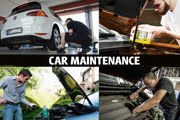Essential Car Care Tips: Keeping Your Vehicle in Top Shape - Vol.488

Essential Car Care Tips: Keeping Your Vehicle in Top Shape
Owning a car is a significant investment, and proper maintenance is crucial for ensuring its longevity, performance, and safety. Whether you're a seasoned driver or a new car owner, understanding the basics of car care can help you keep your vehicle running smoothly and avoid costly repairs. Here are some essential car care tips that every driver should know to keep their vehicle in top shape.
Regular Oil Changes
One of the most important aspects of car maintenance is changing your oil regularly. Engine oil lubricates the engine’s moving parts, reduces friction, and helps prevent overheating. Over time, oil can become dirty and less effective, leading to engine wear and potential damage. Check your vehicle’s owner’s manual for the recommended oil change interval, which is typically every 4,800 to 12,000 kilometers, depending on your driving habits and the type of oil used. Regular oil changes ensure that your engine stays well-lubricated and performs efficiently.
Monitor Tire Health
Your car’s tires are crucial for safety and performance. Regularly check the tire pressure to ensure they are properly inflated. Under-inflated tires can reduce fuel efficiency and cause uneven wear, while over-inflated tires can lead to a rough ride and reduced traction. Additionally, inspect your tires for signs of wear, such as bald spots or cracks. Rotate your tires every 9,600 to 12,800 kilometers to promote even wear and extend their lifespan. Properly maintained tires improve handling, fuel economy, and overall safety.
Keep an Eye on Fluid Levels
Your vehicle relies on various fluids to function correctly. In addition to engine oil, other essential fluids include coolant, brake fluid, power steering fluid, and transmission fluid. Regularly check these fluid levels and top them up as needed. Low fluid levels can lead to overheating, poor braking performance, and transmission issues. If you notice any leaks or a drop in fluid levels, have your vehicle inspected by a professional to address potential issues before they become major problems.
Replace Air Filters
Air filters play a critical role in keeping your engine running smoothly. The engine air filter prevents dirt and debris from entering the engine, while the cabin air filter keeps the air inside your vehicle clean. Over time, these filters can become clogged, reducing engine performance and affecting air quality. Check your owner’s manual for recommended replacement intervals and replace the filters as needed. Clean air filters help improve fuel efficiency, engine performance, and overall comfort.
Maintain Your Battery
A well-maintained battery is essential for starting your vehicle and powering its electrical systems. Regularly check the battery terminals for corrosion and clean them if necessary. Ensure that the battery is securely mounted and that the cables are tightly connected. If your battery is more than three years old, consider having it tested by a professional to ensure it’s still in good condition. A reliable battery ensures smooth starts and prevents unexpected breakdowns.
Perform Regular Brake Checks
Your car’s braking system is vital for safety. Regularly check the brake pads and rotors for wear and replace them as needed. If you notice any unusual noises, vibrations, or a soft brake pedal, have your braking system inspected promptly. Keeping your brakes in top condition ensures that you can stop safely and effectively, reducing the risk of accidents.
Clean and Protect Your Vehicle
Regular cleaning and detailing not only keep your car looking good but also help protect its exterior and interior. Wash your car regularly to remove dirt, salt, and grime that can lead to corrosion and paint damage. Wax your vehicle every few months to protect the paint and maintain its shine. Inside, vacuum and clean upholstery to prevent stains and wear. Regular cleaning helps maintain your car’s value and appearance.
Schedule Routine Maintenance
In addition to these basic car care tips, it’s important to schedule regular maintenance with a professional mechanic. Follow the maintenance schedule outlined in your owner’s manual, which may include services such as fluid changes, filter replacements, and inspections. Routine maintenance helps identify and address potential issues early, ensuring your vehicle remains in optimal condition.
By following these essential car care tips, you can keep your vehicle running smoothly, improve its performance, and extend its lifespan. Regular maintenance not only enhances your driving experience but also helps prevent unexpected breakdowns and costly repairs. Invest time and effort in caring for your car, and you’ll enjoy a reliable and enjoyable driving experience for years to come.